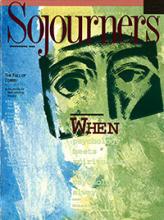LIMA, PERU -- "Let God tear out their hearts of stone and replace them with ones made of flesh," prayed Peruvian Bishop Luis Bambaren as he stood beside the Bible-laden coffin of the third priest murdered in his diocese in as many weeks.
He was referring to the members of the Communist Party of Peru-Shining Path, who shot Father Alessandro (Sandro) Dordi, 60, on August 25. The chunky, bespectacled Dordi, a native of Bergamo, Italy, was captured as he returned from saying Mass and distributing food near the industrial city of Chimbote, 280 miles north of Lima, Peru's capital.
Sixteen days earlier, a band of about 20 guerrillas murdered Polish priests Zbigniew Strzalkowski and Michael Tomaszek, also near Chimbote. Spanish priest Miguel Company was shot in the face by guerrillas on July 27, but survived.
That puts the number of foreign religious murdered by guerrillas since beginning their war in 1980 at four, all this year, heralding a terrifying new chapter in the Shining Path's campaign to seize power in Peru. Foreign missioners are facing a terrible choice -- remain and risk death or abandon their commitment to be in solidarity with the poor.
A Maoist insurgency, the Shining Path (Sendero Luminoso) believes that only violence will bring change. Killing local authorities and threatening foreign aid workers is part of their strategy to empty the countryside of competition, thereby winning control for themselves.
In many areas, the security forces have inadvertently helped guerrillas by waging a "dirty war" where the civilian population is the prime target. Since 1982, more than 23,000 Peruvians have fallen victim to political violence, according to the Peruvian Senate, and thousands of others have abandoned their homes.
Read the Full Article

